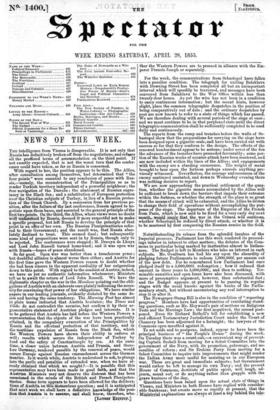NEWS OF THE WEEK.
THE intelligence from Vienna is disagreeable. It is not only that Russia has definitively broken off from the negotiations, and refgaes all the proffered terms of acoommodation on the third point. If not exactly expected, that is not the worst turn that the confer- ences could have taken, so far as Russia is concerned.
With regard to her, the position appears to be this. The Allies, after consultation among themselves, had determined that "the four points" were essential to any conclusion of peace with Rus- sia,—namely, the reconstruction of the Principalities so as to render Turkish territory independent of a powerful neighbour; the free navigation of the Danube ; the abatement of Russian supre- inacy in the Black Sea ; and a substitution of European protection over the Christian subjects of Turkey, in lien of a Russian protec- tion of the Greek Church. By a concession from her previous po- sition, after the failure of the last conferences, Russia agreed to ne- gotiate upon these bases and assented to the general principle of the first two points. On the bases, the Allies, whose views were no doubt well understood by Russia, deemed it more respectful not to make a specific proposal, but left Russia to develop the principle of that point in an offer of her own. The Russian Plenipotentiaries refer- red to their Government; and the result was, that Russia abso- lutely declined to treat. This seemed final; but subsequently some kind of propositions were sent in by Russia, though only to be rejected. The conferences were stopped; M. Drouyn de Lhuys and Lord Sohn Russell turned homeward; and it was open war with Russia—hopes of peace abandoned. So far good. Open war was better than a treacherous peace ; but doubtful alliance is almost worse than either; and Austria for the first time gave the Western Powers reason to doubt whether she had been sincere in the apparent cordiality of her cooperation down to this point. With regard to the conduct of Austria, indeed, we have as yet no authentic information whatsoever; Ministers tell us to await the return of Lord John RusselL We have the diplomatic chapter on the war in the .Moniteur pointing out the obli- gations of Austria with an elaborate care plainly indicating the neces- sity for convincing that power of her obligations. We have similar papers in our leading journals, evidently dictated by the same de- sire and having the same tendency. The Morning Post has almost in plain terms indicated that Austria hesitates; the Times and Globe do not contradict the surmise, but confirm it by their ar- gumentative statement of Austrian pledges and interests. It is to be gathered that Austria has laid before the Western Powers a representation that the objects of the war have been practically attained, in the compulsory evacuation of the Principalities by Russia and the effectual protection of that territory, and in the maritime expulsion of Russia from the Black Sea, which the Western Powers have shown their ability to enforce at will ; results which secure the independence of Turkey by land and the safety of Constantinople by sea. At the same time, a closer union between Austria and Prussia, and there- fore Germany, rendered possible by the renewal of peace, would secure Europe against Russian encroachment across the German frontier. Is it worth while, Austria is understood to ask, to plunge into the perils and penalties of extended war, when we have al- ready obtained that which we sought ?—It is possible that this representation may have been made in good faith, and that the Austrian Ministers may not deserve the distrust that has been occasioned in the minds of the British and French Plenipoten- tiaries. Some term appears to have been allowed for the delibera- tions of Austria on this momentous question ; and it is anticipated that next week we shall have a definitive knowledge of the posi- tion that Austria is to assume, and shall know, therefore, whe-
ther the Western Powers are to proceed in alliance with the Em- peror Francis Joseph or separately.


























